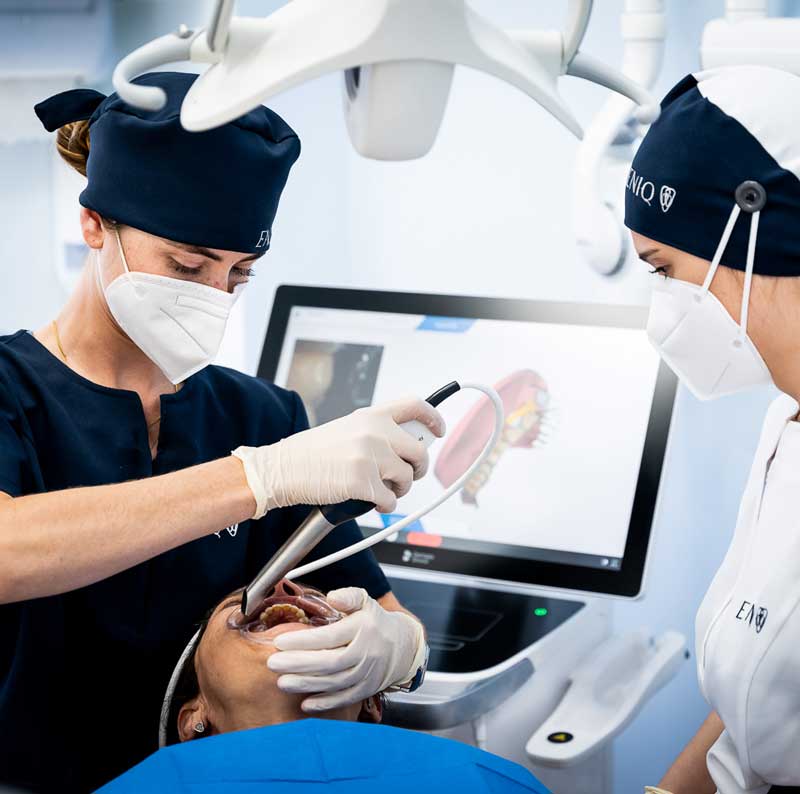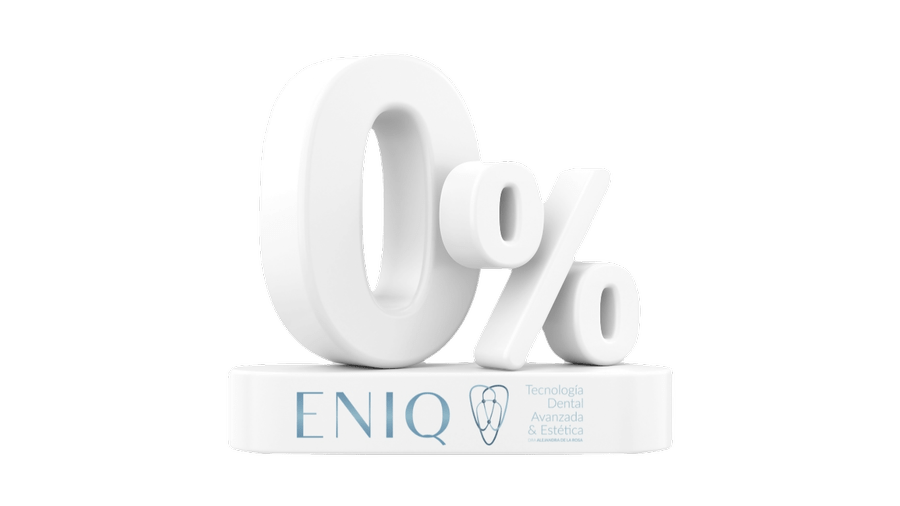

Dental Hygiene
Comprehensive services for a healthy and radiant smile.
What dental hygiene technique is recommended for adults?
Toothbrushing:
- Use a toothbrush with soft bristles and make sure to replace it every 3 to 4 months or earlier if the bristles are worn out.
- Apply an adequate amount of fluoride toothpaste to the brush.
- Position the brush at a 45-degree angle towards the gum line.
- Make vibrating movements from front to back and short, gentle sweeping motions on the upper teeth from top to bottom and on the lower teeth from bottom to top. Unlike children, you should open your mouth wide and brush both the outer and inner surfaces of the teeth.
- Don't forget to brush the chewing surfaces of the teeth.
- Remember to brush your tongue as well to remove bacteria and freshen your breath.
- Brush your teeth for at least two minutes, twice a day, preferably in the morning and before bedtime. Ideally, it would be three times a day, after each meal.
Use of dental floss:
- Cut approximately 45 cm of dental floss and wrap it around your middle fingers, leaving about 5 cm of space between them.
- Gently slide the dental floss between your teeth, using a sawing motion, and make sure to reach up to the gum line.
- Curve the dental floss around each tooth and move the floss up and down to remove plaque and food debris.
- Use a clean section of dental floss for each interdental space.
- Perform this dental flossing technique at least once a day, preferably before bedtime.
In addition to brushing and using dental floss, other complementary techniques can be considered, such as mouth rinsing with a dentist-recommended antimicrobial mouthwash, using interdental brushes to clean wider spaces between teeth, and scheduling regular visits to the dentist for professional cleanings and oral health evaluations.
Remember that it is important to consult with your dentist to receive specific recommendations tailored to your individual dental needs.
How should children brush their teeth?
Properly brushing children's teeth is essential for maintaining good oral hygiene from an early age. Here are some tips on how to brush children's teeth:
- Choose the right toothbrush: Use a toothbrush with soft bristles and an appropriate size for the child's mouth. There are toothbrushes specifically designed for children with attractive colors and designs that can make brushing more fun.
- Use fluoride toothpaste: From the age of 2, it is recommended to use fluoride toothpaste. Make sure to use an appropriate amount of toothpaste, about the size of a pea, to prevent the child from swallowing it excessively.
- Teach the proper technique: Show your child how to brush their teeth correctly. Place the brush at a 45-degree angle towards the gum line and make gentle circular movements on each tooth, both on the outer and inner surfaces. Make sure to brush the tongue as well to remove bacteria and freshen breath.
- Supervise brushing: It's important to supervise children's brushing until they have the dexterity to do it correctly on their own, typically around 6-8 years of age. Ensure they brush for at least two minutes, twice a day.
- Make brushing fun: You can make brushing a fun and enjoyable activity for your child. Use songs, games, or brush your teeth together as part of the daily routine.
- Establish good oral hygiene habits: In addition to brushing, teach your child the importance of using dental floss and performing proper mouth rinses when appropriate for their age. Encourage good oral hygiene habits and be sure to schedule regular visits to the dentist for check-ups and cleanings.
Remember that every child is different, so it's important to adapt the approach to their individual needs and level of development. Also, don't hesitate to consult with a pediatric dentist for specific and personalized recommendations for your child.
How should mouth cleaning be done for babies?
Mouth cleaning for babies is important for maintaining good oral health and establishing oral hygiene habits from an early age. Here are some tips on how to clean a baby's mouth:
From birth:
- Clean the baby's gums even before the teeth appear. You can use a gauze or a soft, damp cloth to gently wipe the gums after each feeding.
When the first teeth appear:
- Starting from the appearance of the first tooth, gently brush the baby's teeth twice a day with a soft toothbrush with small bristles.
- Use clean water to brush the baby's teeth. It is not necessary to use fluoride toothpaste until the child is about 2 years old, unless recommended by the dentist.
Proper brushing:
- Position the baby on your lap or in a comfortable position that allows easy access to their mouth.
- With the toothbrush, gently brush the baby's teeth in gentle circular motions. Make sure to brush both the front and back of the teeth.
- Pay special attention to the areas where the teeth meet the gums, as plaque tends to accumulate there.
- As the back teeth erupt, you may need to use a toothbrush with a smaller head or one designed for babies.
Establish a routine:
- Create a daily toothbrushing routine for the baby, such as after breakfast and before bedtime.
- As the baby grows, allow them to participate in brushing, holding the toothbrush or attempting to brush their teeth under your supervision.
In addition to brushing, it's important to avoid using bottles or pacifiers with sugary liquids or milk overnight, as this can contribute to the development of cavities in baby teeth.
Remember to schedule the baby's first dental visit around the age of one year or when the first tooth appears. The dentist can assess the baby's oral health and provide additional recommendations for mouth cleaning and dental care at this early stage.
It's important to note that the provided tips are general, and it is advisable to consult with a pediatric dentist for specific and individualized recommendations for your baby's needs.
Benefits
How often should dental cleanings be done?
It is recommended to undergo a professional dental cleaning, also known as dental prophylaxis, at least twice a year. These regular cleanings are a fundamental part of maintaining good oral health and help prevent the buildup of dental plaque, the development of gum diseases, and the formation of cavities.
However, the exact frequency of dental cleanings may vary depending on the individual needs of each person. Some individuals may require more frequent cleanings due to factors such as a higher buildup of plaque, an increased risk of gum diseases, or the presence of specific dental conditions.
It is important to consult with your dentist to determine the appropriate frequency of dental cleanings based on your dental situation and personalized recommendations. Your dentist will evaluate the condition of your oral health, including the presence of plaque, dental calculus, gum diseases, or other dental issues, and provide guidance on the optimal frequency for your dental cleanings.


What is the best mouthwash for children?
When it comes to mouthwashes or mouth rinses for children, it's important to consider that some products are specifically designed for them, with formulas and concentrations suitable for their age.
Here are some recommended mouthwashes for children:
- Mouthwashes with fluoride: These mouth rinses are beneficial for strengthening tooth enamel and preventing cavities. Consult your dentist regarding the appropriate amount of fluoride for the child's age and choose a reliable brand that offers specific options for children.
- Alcohol-free mouthwashes: These are a gentler option for children, avoiding potential irritation of sensitive gums, and often have appealing flavors that can help freshen breath.
- Mouthwashes with attractive flavors: They can make the experience more enjoyable and encourage regular use. Brands that offer mouthwashes with flavors like strawberry, grape, or mild mint may be more appealing to children.
It's important to ensure that the chosen mouthwash is safe and suitable for the child's age. Read the instructions carefully and follow the manufacturer's usage recommendations. Remember that it should not replace brushing and flossing.
It's always advisable to consult with a pediatric dentist for specific recommendations tailored to your child's needs.
What is the best mouthwash for periodontitis?
In the case of periodontitis, a mouthwash alone will not be sufficient to fully treat the disease. However, there are mouthwashes that can be useful as a complement to periodontal treatment.
When choosing a mouthwash for periodontitis, it is recommended to look for those that contain specific ingredients for gum care and bacteria control. Some options include:
- Mouthwashes with chlorhexidine: These can help reduce bacterial plaque and control gum inflammation, although prolonged use may have side effects such as dental discoloration.
- Mouthwashes with hydrogen peroxide: Another antimicrobial agent that can help reduce bacterial load in the mouth; some gum care mouthwashes contain it as an active ingredient to control periodontitis.
Remember that the use of mouthwashes should be recommended by a dentist and used according to the provided instructions. Additionally, it is essential to maintain a good oral hygiene routine and consult with a dentist specialized in periodontics for specific recommendations based on your case.
What is the best mouthwash for gums?
When looking for a mouthwash for gum care, it is important to choose those specifically designed to improve gum health.
Here are some common ingredients found in gum care mouthwashes that could be beneficial:
- Chlorhexidine: An antimicrobial agent that can help reduce bacterial plaque and control gum inflammation.
- Fluoride: Known for strengthening tooth enamel and preventing cavities, some gum care mouthwashes contain fluoride.
- Hydrogen peroxide: An antimicrobial agent that can reduce bacterial load and promote gum health; some gum care mouthwashes include it.
- Essential oils: Some gum care mouthwashes contain natural essential oils with antibacterial and anti-inflammatory properties.
Remember that mouthwash is a complement to brushing and flossing and should not replace these fundamental oral hygiene practices. Additionally, it is advisable to consult with a dentist for specific recommendations tailored to your dental situation.
The dentist can assess the condition of your gums and provide guidance on the proper use of gum care mouthwashes, as well as additional recommendations for gum care and health.
What is the best mouthwash for cavities?
When looking for a mouthwash for cavity prevention, it is important to choose those that contain ingredients that strengthen tooth enamel and help prevent cavities.
Here are some common ingredients found in cavity prevention mouthwashes:
- Fluoride: One of the most important ingredients for cavity prevention, it strengthens tooth enamel and makes it more resistant to demineralization.
- Xylitol: A natural sweetener that can help prevent cavities by reducing the number of acid-producing bacteria in the mouth.
- Calcium and phosphate: Some cavity prevention mouthwashes contain essential minerals for dental health, which can help remineralize damaged tooth enamel and strengthen it.
Remember that mouthwash is a complement to brushing and flossing and should not replace these fundamental oral hygiene practices. Additionally, it is advisable to consult with a dentist for specific recommendations tailored to your dental situation.
The dentist can assess your risk of cavities and provide guidance on the proper use of cavity prevention mouthwashes, as well as additional recommendations for cavity prevention. They may also recommend mouthwashes with customized fluoride concentrations based on your needs.
What is the best electric toothbrush?
There are numerous brands and models of electric toothbrushes on the market, and determining the best one may depend on individual needs and preferences. However, here are some popular and reputable brands that offer quality electric toothbrushes:
- Oral-B: Oral-B is a leading brand in electric toothbrushes and offers a wide range of models with various features. Their toothbrushes often have oscillating or rotating round heads that provide a deep cleaning.
- Philips Sonicare: Philips Sonicare is another recognized brand in the electric toothbrush market. Their toothbrushes use sonic vibration technology to remove plaque and provide a gentle yet effective cleaning.
- Colgate: Colgate also offers electric toothbrushes with features like oscillating and pulsating movements for superior cleaning. Their models tend to be more affordable compared to other brands.
- Waterpik: While Waterpik is better known for its water flossers, they also offer electric toothbrushes. These toothbrushes typically combine sonic cleaning with the ability to use the toothbrush alongside the water flosser for a more comprehensive cleaning.
When selecting an electric toothbrush, it is advisable to consider the following features:
- Cleaning technology: Common options include oscillating, rotating, and sonic brushes. Each technology has its own advantages, and it's important to choose the one that suits your needs.
- Replacement heads: Check if the electric toothbrush has easily available replacement heads and if they are compatible with a variety of options to suit your preferences.
- Timer: Many electric toothbrushes include timers that help you brush for the recommended time, usually two minutes.
- Cleaning modes: Some toothbrushes offer different cleaning modes, such as gentle cleaning, deep cleaning, gum massage, etc., to suit your specific needs.
Additionally, it is advisable to consult with your dentist for personalized recommendations based on your individual dental needs. Your dentist can provide guidance on which features are most important for you and which brand or model may be the most suitable for your particular case.
Which Dental Irrigator is Best?
There are several brands and models of dental irrigators on the market, and the choice of the best dental irrigator will depend on your personal needs and preferences.
Here are some recognized and popular brands that offer quality dental irrigators:
- Waterpik: Waterpik is a leading brand in dental irrigators and offers a wide range of models. Their irrigators use water jet technology to clean between teeth and along the gumline. Waterpik offers different features and pressure options to suit individual needs.
- Philips Sonicare AirFloss: Philips Sonicare, known for its electric toothbrushes, also offers the AirFloss model, a compact dental irrigator that uses bursts of air and water to clean interdental spaces.
- Panasonic: Panasonic manufactures high-quality dental irrigators that offer different pressure settings and cleaning modes. Their models are typically compact and easy to use.
- Oral-B: In addition to their electric toothbrushes, Oral-B also has a dental irrigator model. This irrigator combines water jet with pulsations for a more comprehensive cleaning.
When selecting a dental irrigator, consider the following aspects:
- Adjustable pressure: Look for a dental irrigator that allows you to adjust the water jet pressure to your comfort and specific needs.
- Water reservoir capacity: Check the size of the dental irrigator's water reservoir. A larger reservoir can provide longer usage time without the need for refilling.
- Design and ease of use: Consider the ergonomic design of the dental irrigator and its ease of use, especially if you have manual dexterity difficulties.
- Additional features: Some dental irrigators offer additional features such as timers, different cleaning modes, or interchangeable nozzles. Evaluate which features are important to you.
Remember that a dental irrigator should not replace brushing and flossing but complement them as part of a complete oral hygiene routine. If you have specific dental questions or needs, I would recommend consulting your dentist, who can provide personalized recommendations based on your oral situation.
OUR RECOMMENDATIONS:
What are the benefits of getting a dental cleaning at ENIQ?
Dental cleaning with technology can offer several advantages compared to traditional techniques.
Some of the benefits of getting a dental cleaning with technology include:
- Greater precision: Technological advancements in dentistry allow for a more precise and effective dental cleaning. State-of-the-art tools and devices can reach difficult-to-access areas and remove bacterial plaque and tartar more efficiently.
- Less discomfort: Some technologies used during dental cleaning can reduce discomfort and sensitivity. For example, ultrasound devices can provide a gentler and less traumatic cleaning for gum tissues.
- Early problem diagnosis: Technology used during dental cleaning may include intraoral cameras and digital X-rays, enabling detailed visualization of teeth and oral structures. This facilitates early detection of issues like cavities, gum diseases, or dental abnormalities, leading to faster and more effective treatment.
- Time efficiency: Some technological techniques and devices can speed up the dental cleaning process, reducing the total time spent in the dental office and improving efficiency. This is particularly beneficial for patients with busy schedules or those who may experience anxiety or discomfort during prolonged dental treatments.
- Enhanced aesthetic results: Some technologies, such as laser teeth whitening, can provide improved aesthetic results during dental cleaning. These procedures can help eliminate stains and discolorations on teeth, enhancing the overall appearance of the smile.
It's important to note that not all technologies are available in every dental office, and the choice of technology used may vary depending on the case and individual needs. If you're interested in dental cleaning with technology, I would recommend discussing it with your dentist to get more information about available options and how they can benefit you in your specific case.
What is the price of painless dentistry?
Price of dental cleaning in clinics and insurance companies
Below, we will show you a series of examples with the prices of dental cleaning in different clinics and insurance companies.
- 2024 prices for dental cleaning from major insurance and dental franchises: starting at 57 € for non-insured individuals, otherwise it would be 0€ or deducted from the annual payment. This does not include extras such as plaque detector, bicarbonate, 2nd prophylactic paste, or a surcharge for complex cases.
- 2024 prices for private clinics range between 80 and 123 € without including extras.

- Financing: Up to 24 months with no interest. Up to 60 months with preferential conditions.
- Payment installment: Pay for the treatment in convenient monthly installments.
- We offer an early payment discount: Paying for the entire treatment upfront.
- Multiple payment options: Direct debit, credit card, cash, bank transfer, Apple Pay, Google Pay, and Bizum.
Oral Cleaning
Healthy Smile
*subject to specialist assessment
Our oral hygiene service offers a professional and comprehensive cleaning to keep your smile radiant and healthy. With advanced techniques and personalized attention, our specialized team focuses on removing plaque and maintaining the health of your teeth and gums.
-
All-inclusive
-
Interest-free Financing
Frequently Asked Questions
Do you have more questions about dental hygiene?
- Use a toothpaste for sensitive teeth: There are toothpaste formulations specifically designed for people with dental sensitivity. These toothpaste products contain ingredients that help reduce sensitivity and protect dental enamel. Use them regularly as directed by the manufacturer.
- Rinse with warm saltwater: Mix half a teaspoon of salt in a glass of warm water and gently rinse with this solution. This can help reduce inflammation and relieve sensitivity. If you do not have hypertension.
- Avoid extremely hot or cold foods and drinks: During the first few hours after dental cleaning, avoid extremely hot or cold foods and drinks, as they can increase dental sensitivity. Opt for foods and beverages at room temperature.
- Avoid acidic foods and drinks: Acidic foods and beverages, such as citrus fruits and sodas, can irritate sensitive teeth. Avoid them or consume them in moderation.
- Use dental sensitivity products: There are over-the-counter products, such as gels or mouthwashes, specifically designed to relieve dental sensitivity. Follow the product's instructions and use them as needed.
- Maintain good oral hygiene: Ensure that you maintain a good oral hygiene routine, including brushing twice a day with a soft-bristle toothbrush and daily flossing. Good oral hygiene can help prevent dental sensitivity and keep your teeth and gums healthy.
If sensitivity persists or is very intense, it is important to consult your dentist. They can assess the cause of the sensitivity and recommend additional treatments, such as fluoride varnishes, sealants, or applications of specific products to reduce sensitivity.
Remember that every person is different, so it is important to communicate your symptoms to the dentist to receive personalized and appropriate care based on your needs.
Yes, it is highly recommended to use dental floss or dental tape as part of a complete oral hygiene routine. Brushing alone is not sufficient to effectively remove plaque and food residues that accumulate between the teeth and along the gumline. Dental floss or tape allows access to these hard-to-reach areas, helping to prevent plaque buildup and the development of cavities and gum diseases.
Here are some reasons why it is necessary to use dental floss or dental tape:
- Plaque removal: Dental floss or tape are effective tools for removing dental plaque, a sticky film composed of bacteria and food debris that accumulates on teeth and gums. By passing dental floss between the teeth, you can eliminate food residues and plaque that the toothbrush cannot reach.
- Cavity prevention: Dental plaque can cause tooth decay if not adequately removed. Regular use of dental floss or tape helps prevent plaque buildup between teeth and along the gumline, reducing the risk of cavities.
- Gum health: Plaque buildup in interdental spaces can lead to gum inflammation, known as gingivitis. Using dental floss or tape helps keep gums clean and healthy, preventing gingivitis and periodontal disease.
- Bad breath: Food residues and plaque trapped between teeth can contribute to bad breath. Using dental floss or tape helps remove these residues, improving breath freshness.
It is recommended to use dental floss or dental tape at least once a day, preferably before bedtime, although it is ideal to use it after every meal. It is important to use the proper technique to gently pass the dental floss between the teeth, avoiding gum injuries.
If you have any doubts about how to correctly use dental floss or tape, I would recommend consulting your dentist. The dentist can provide you with precise instructions tailored to your dental situation to ensure effective and safe cleaning.
